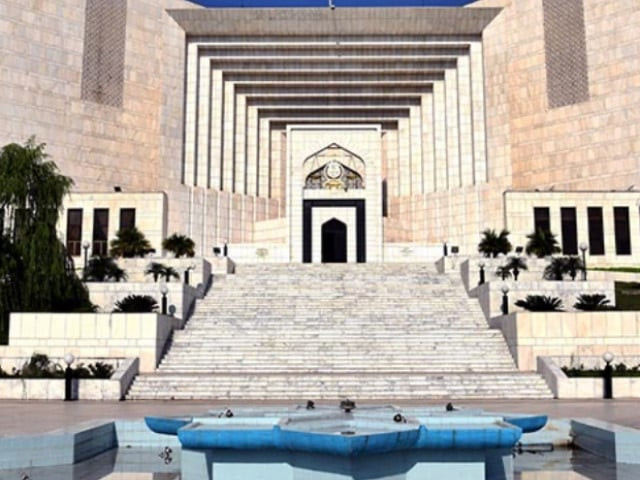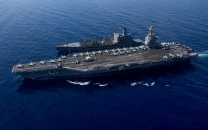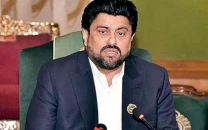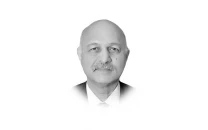Civilians court martial not prohibited under international laws, says SC judge
The SC judge made these remarks during the hearing of intra-court appeals.

Justice Naeem Akhtar Afghan of the Supreme Court’s constitutional bench stated on Tuesday that international law does not explicitly prohibit the court-martial of civilians.
The SC judge made these remarks during the hearing of intra-court appeals challenging the declaration of civilian trials in military courts as null and void.
During the proceedings, Justice Jamal Khan Mandokhel inquired about the implications if a country fails to adhere to international regulations. The appeals were heard by a seven-member bench, led by Justice Aminuddin Khan.
Justice Naeem Akhtar Afghan, during the hearing of an intra-court appeal against the decision to try civilians in military courts, remarked that international principles do not state that civilians cannot be court-martialed.
The lawyer of the May 9th accused, Arzam Junaid, Salman Akram Raja, continued his arguments, saying that he would complete his arguments by 11 AM. Justice Jamal Mandokhel remarked that it would be better if the arguments were completed in half an hour.
Salman Akram Raja responded by saying that he should be allowed to say what he wanted so that he could finish by 11. He emphasised that in simple terms, civilians’ basic rights should not be terminated to conduct a court-martial.
Salman Akram Raja argued that court-martialing civilians goes against international standards for a fair trial.
"International standards require that trials be public, fair, and transparent, with decisions being made public. Decisions from military tribunals around the world are often appealed in courts, and a ruling by a European court has forced many countries to revise their court-martial procedures," he said.
Justice Jamal Mandokhel asked, "What would happen if international principles are not followed?" To which Salman Akram Raja responded, "Not adhering to international principles means that the trial is not transparent."
Justice Mandokhel pressed further, "What happens if a country violates international principles?" Raja replied, "Some international principles are mandatory, while others are not. However, the principle of a fair trial, as enshrined in Article 10A of our Constitution, was added in light of international standards."
Justice Naeem Akhtar Afghan then remarked, "Nowhere in international principles does it state that civilians cannot be court-martialed."
Salman Akram Raja pointed out that in the UK, court-martials are conducted by independent judges, not military personnel. "In the FB Ali case, the principle of separation of powers wasn’t in place. At that time, deputy commissioners and tehsildars conducted criminal trials. It was argued that if a deputy commissioner could conduct a criminal trial, a colonel could do so as well."
Raja continued, "All countries present their compliance with international principles to the United Nations. The UN’s Human Rights Committee reviews these reports and gives their opinion." He added that last year, in October and November, the UN Human Rights Committee reviewed Pakistan’s military justice system and expressed concern over the court-martialing of civilians.
"The committee found that Pakistan's military courts are not independent," he noted, "and they recommended granting bail to those in military custody." Raja also mentioned that the European Commission had stated that the court-martial of the nine protestors was incorrect, and that the European Union had granted Pakistan GSP Plus status.
He further highlighted, "Justice Yahya Afridi raised these same concerns in his dissenting note, asking why thousands could be tried in ATC courts but not the 105 in question."
During the hearing, an interesting exchange took place between Salman Raja and Justice Naeem Akhtar Afghan.
Salman Raja said, "In the UK, there was a case where a soldier named Fedley was court-martialed. The European Court of Human Rights declared his military trial invalid because Fedley, who was suffering from mental stress, had fired a weapon. Justice Mohammad Ali Mazhar, you may recall, noted that Fedley’s firing also resulted in a TV being broken. Interestingly, a similar thing happened during the May 9th incidents – a TV was broken there too."
He continued, "The person who broke the TV during the May 9th events was someone I met later. He was deeply ashamed of what had happened. He was an unemployed individual, with only four grades of education. And I couldn’t help but feel for him – he was a victim of the society that gave so little to people like him."
Justice Ameenuddin Khan intervened, advising against discussing personal matters, while Justice Jamal Khan Mandokhel asked Salman Raja if he had met Fedley.
Justice Naeem Akhtar Afghan, smiling, remarked, "No, Salman Raja has met the Pakistani Fedley."
Justice Hassan Azhar Rizvi then commented, "You said your client used to play first-class cricket. He didn’t go to play cricket on May 9th, did he?"
Justice Mohammad Ali Mazhar questioned, "Under what law was Kulbhushan given the right to appeal? Is that law present before us?" To which Additional Attorney General Aamir Rehman responded, "I will bring that law on record."
Justice Mohammad Ali Mazhar remarked, "Was that law introduced only for Kulbhushan?"
Aziz Bhindari responded, "Spies who have permission from the International Court of Justice are entitled to an appeal."
Justice Jamal Khan Mandokhel then asked, "How many Kulbhushans are there here?"
Additional Attorney General Aamir Rehman replied, "Classification is allowed in FB Ali as well."
Salman Raja then expressed his disagreement with the decision of Justice Muneeb Akhtar regarding the establishment of military courts, stating, "No judge should be allowed to include words in the constitution that are not part of the text of the constitution. If this is allowed, it would be extremely dangerous. A judge should not have the authority to insert such words into the constitution."
Justice Jamal Khan Mandokhel responded, "Another example could be from Anarkali Bazaar, where outside a shop it was written ‘Badhia Quality’ (Good Quality), but someone read it as ‘Badhia Ko Ulti’ (The elderly is vomiting). This also made the courtroom burst into laughter."
Salman Raja referenced the Practice and Procedure decision and the review decisions of Article 63-A, emphasizing that no court in the world will be free unless it ensures the right to a fair hearing. He argued that even without Article 175(3) of the Constitution, Section 2(D) of the Army Act could be declared null and void based on Article 10-A.
Justice Mohammad Ali Mazhar remarked, "Justice Muneeb Akhtar, in the majority decision, considered military courts as a parallel judicial system." Salman Akram Raja responded, "Justice Muneeb Akhtar made this interpretation of the Constitution by considering history. He wrote that military courts have a historical background, and interpreting the Constitution based on history could lead to extremely dangerous outcomes. This is an extremely dangerous way to interpret the Constitution."
He further argued, "When the Constitution is clear, it cannot be self-interpreted, as was the case in the interpretation of Article 63-A, but in the review of Article 63-A, the interpretation was correct."
With that, Salman Akram Raja concluded his arguments, and the Supreme Court adjourned the hearing of the military courts case until tomorrow. The founder of PTI's lawyer, Azir Bhindari, will begin his arguments tomorrow.





1615028531-6/denso-hall-khi-(7)1615028531-6-208x130.webp)















COMMENTS
Comments are moderated and generally will be posted if they are on-topic and not abusive.
For more information, please see our Comments FAQ